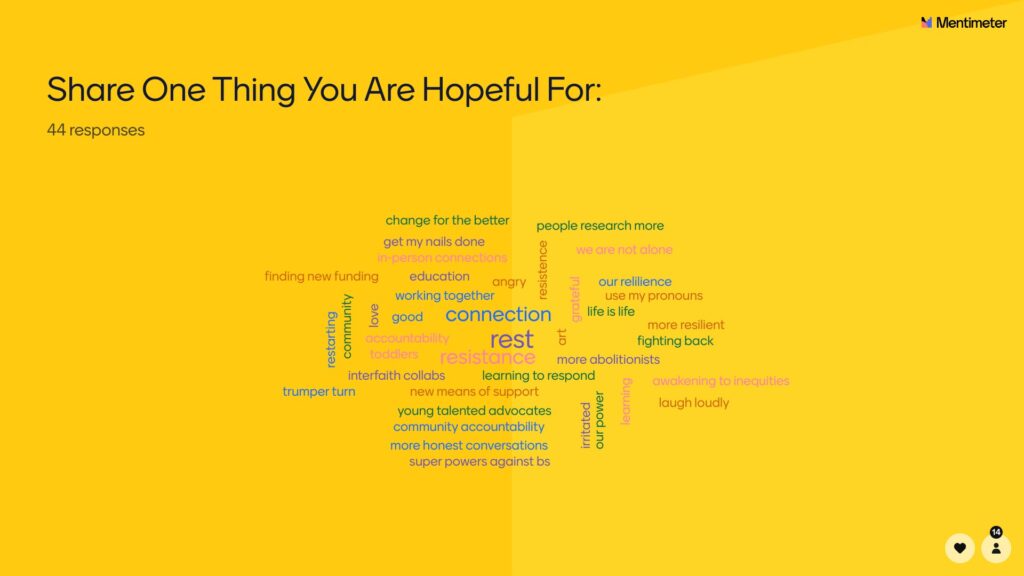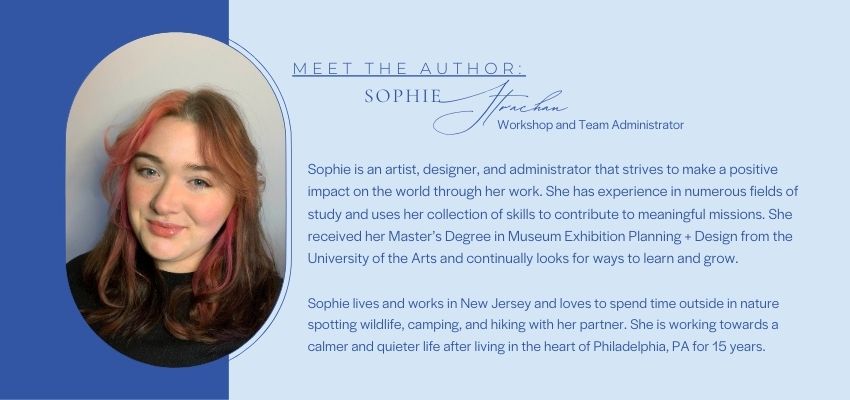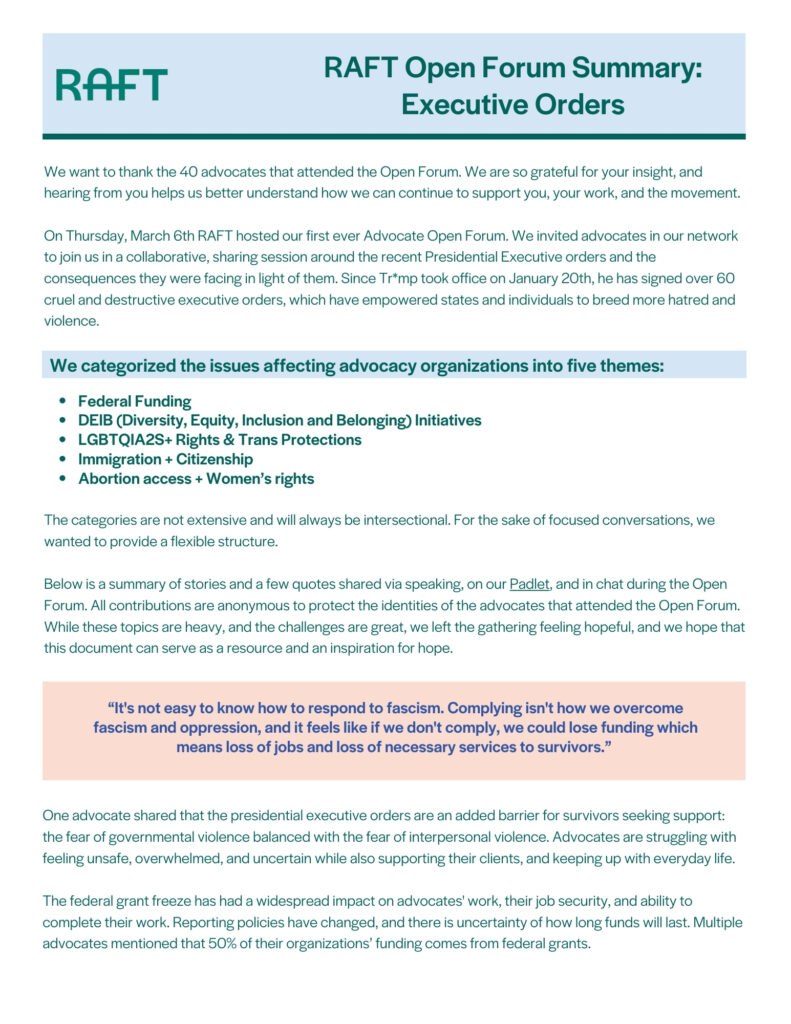Open Forum Summary: Presidential Executive Orders
Sophie Strachan, April 15, 2025
We want to thank the 40 advocates that attended the Open Forum. We are so grateful for your insight, and hearing from you helps us better understand how we can continue to support you, your work, and the movement.
On Thursday, March 6th RAFT hosted our first ever Advocate Open Forum. We invited advocates in our network to join us in a collaborative, sharing session around the recent Presidential Executive orders and the consequences they were facing in light of them. Since Tr*mp took office on January 20th, he has signed over 60 cruel and destructive executive orders, which have empowered states and individuals to breed more hatred and violence.
We categorized the issues affecting advocacy organizations into five themes:
- Federal Funding
- DEIB (Diversity, Equity, Inclusion and Belonging) Initiatives
- LGBTQIA2S+ Rights & Trans Protections
- Immigration + Citizenship
- Abortion access + Women’s rights
The categories are not extensive and will always be intersectional. For the sake of focused conversations, we wanted to provide a flexible structure.
Below is a summary of stories and a few quotes shared via speaking, on our Padlet, and in chat during the Open Forum. All contributions are anonymous to protect the identities of the advocates that attended the Open Forum. While these topics are heavy, and the challenges are great, we left the gathering feeling hopeful, and we hope that this information can serve as a resource and an inspiration for hope.
“It's not easy to know how to respond to fascism. Complying isn't how we overcome fascism and oppression, and it feels like if we don't comply, we could lose funding which means loss of jobs and loss of necessary services to survivors.”
One advocate shared that the presidential executive orders are an added barrier for survivors seeking support: the fear of governmental violence balanced with the fear of interpersonal violence. Advocates are struggling with feeling unsafe, overwhelmed, and uncertain while also supporting their clients, and keeping up with everyday life.
The federal grant freeze has had a widespread impact on advocates' work, their job security, and ability to complete their work. Reporting policies have changed, and there is uncertainty of how long funds will last. Multiple advocates mentioned that 50% of their organizations funding comes from federal grants.
“When I first saw the message that grant applications were closed on the OVW website I was frozen. I knew that I needed to respond or do something, but I couldn't. I couldn't think of what to do, I couldn't process the impact this would have. I just had to accept that what I needed to do was sit and be in shock for awhile.”
Censorship of Diversity, Equity and Inclusion is prevalent throughout every aspect of advocacy organizations in fear of losing federal funds. DEI language has been removed from marketing materials, websites, grant reporting forms, and pronouns are being deleted from email signatures and business cards. Materials specifically created for the LGBTQ community were quickly removed within one organization but were republished later with an apology statement.
“We have a First Amendment right to do this work.”
In response to anti-trans rights legislation and the fear of violence or discrimination, folks have asked loved ones to refrain from using their pronouns in public. We are fighting against the erasure of language, of culture, of our identities. Which brought up the question of how advocates can continue to do this work, to talk about their work with the exclusion of DEI forward terminology. Find a full list of “banned” words here.
“Being an advocate, it becomes harder for me to see how I can help them (survivors) become independent.”
Survivors with different immigration or citizenship statuses are facing challenges with choosing between seeking protection in court and possibly questioned about their immigration status or going back to their abuser because they’re left with no other option. Advocates from Native Nations shared that their communities are scared of the threat of deportation, and discrimination even though they are American citizens. Culturally specific organizations and organizations that serve Immigrants are facing stronger budget cuts and additional challenges with partners pulling funding.
“Some people are restricted without any protection and other people are protected without any restriction.”
From Cruelty as Citizenship by Cristina Beltran
Advocates shared ideas for alternative solutions, and how they are dealing with all these challenges:
- Be proactive: Create plans for protecting staff and supporting them if funding is cut.
- Promote a culture of mutual aid and build community.
- Take time to have fun; Joy builds resilience and is a form of resistance!
- Use social action, in your spare time, as a way of coping.
“I’m waiting for a revolution in all honesty. How do you sign up for this thing? How do we fight back?”
Our Takeaways:
- If we are safe in making the choice, we don’t have to be complicit with fascism, discrimination, or violence.
- Community is more important now than ever. Standing together and supporting mutual aid efforts can be a foundation for resistance.
- We had great feedback from this event, and will work to organize more like it in the future!
Practice Hope:
At RAFT we like to practice positive thinking. We can’t ignore all of the bad things in the world, but we can remain hopeful despite everything. At the end of our Open Forum, we asked advocates to share one thing they were hopeful for, and these were their answers.

Resources:
- https://archivedv.com/ - a Resource of archived webpages, reports, awareness materials, podcast transcripts. You can submit resources by emailing them: IPVarchives@proton.me
- ACLU - https://www.aclu.org/
- Alt National Parks Service - http://www.altusnps.org/
- So.Informed - https://www.soinformed.info/about
- Mutual Aid Hub - https://www.mutualaidhub.org/
To download a copy of this summary use the link here: https://www.raftcares.org/?sdm_process_download=1&download_id=2950









